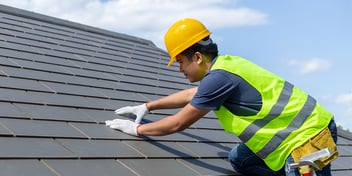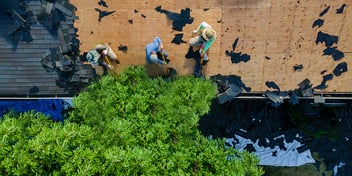- Home »
- Learningcenter »
- Small leak roof worry
FAQ: Is a Small Leak on Your Roof Anything to Worry About?
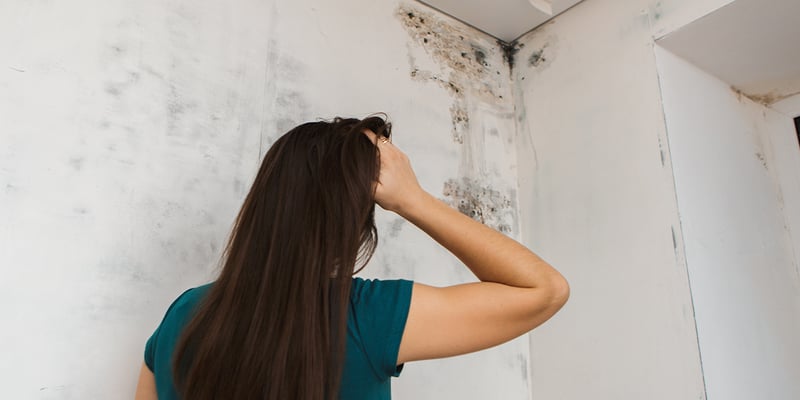
Whether you’ve noticed water stains on your ceiling or rusty nails in your attic, realizing that there is a small leak in your roof can be stressful and frustrating. At the same time, when there isn’t water actively dripping into your living space, it’s easy to put a small leak on the back burner. After all, it’s not causing any obvious damage; it can’t be that big of a deal, right?
Wrong. A roof leak of any kind is something that needs to be addressed right away.
In the title of this article, we ask whether or not a small leak is something to worry about. We aren’t suggesting that you worry about your leaking roof, but we do strongly advise that you take action to address the issue promptly. If you don’t, something that seems like a minor issue will almost certainly develop into a major problem.
Catching a roof leak while it is small is a good thing, but it’s important not to ignore it. If water can penetrate your roofing system in any way, it needs to be addressed promptly. Repairing a small leak doesn’t have to be expensive or extensive, but the longer you wait to deal with it, the more costly the repair will be and the more substantial the damage.
Is a Small Roof Leak a Big Deal?
When you think of a problematically leaking roof, you probably picture gallons of water pouring through your ceiling, damaging all of your possessions and the structural components of your home.
In contrast, a small leak that doesn’t seem to be causing much trouble might not seem like a very big deal. After all, how much damage could it cause?

The answer is a lot. There really isn’t any such thing as a roof leak that you shouldn’t address. Ignoring roof leaks, no matter how small, will make the problem worse and more expensive to fix, not to mention more damaging to your roofing system and home.
Though it might not be the answer you’re looking for, a roof leak of any size and any kind is cause for concern. It’s not something you want to ignore or put on the back burner– it’s always best to address roof leaks (big or small) as soon as possible.
What Can Happen If You Don’t Address a Small Leak in Your Roof?
A leak originating in your attic, even a small one, can begin doing its damage by destroying any items you have stored up there. Maybe your attic is empty, or you’re not particularly concerned about your old Christmas decorations, but the destruction won’t end there.
The leak will grow over time and begin eroding the wooden structural components of your roofing system. Mold and mildew can grow as moisture and water collect in your attic, further leading to rot in your decking and other components.
As water continues seeping into your home, it can affect any electrical wiring in your attic or any lights mounted onto the roof. It can discolor and damage your home’s paint and saturate the attic insulation, making it less effective and leading to more mold growth. Mold in your attic can lead to major air quality concerns in your home– mold and dampness can trigger asthma symptoms and allergic reactions in the people living in your home. Beyond that, dampness in your home can promote the growth of bacteria, viruses, dust mites, and cockroaches.
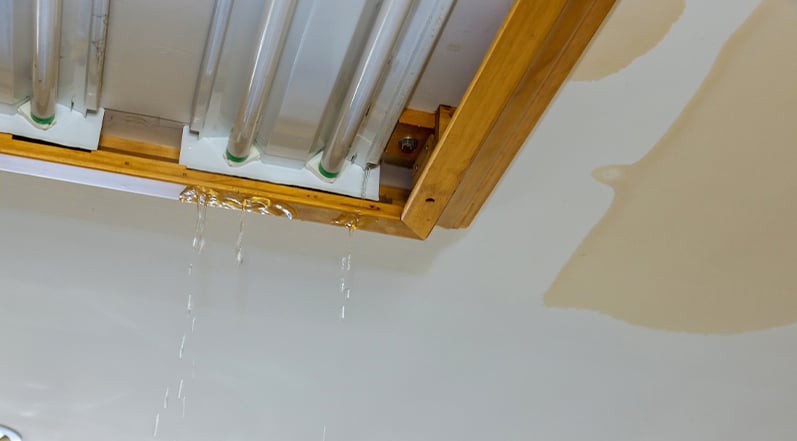
Roof leaks in your attic can unleash a slew of undesirable occurrences– everything from pests entering your home and electrical fires can result from what started as a “small” leak.
One could even argue that a small leak is worse than a larger leak. This is because it can be difficult to even notice a small roof leak as a layperson, and a lot of damage can be done before you even realize what’s happening.
What Should I Do If I Find a Small Roof Leak?
Small roof leaks won’t go away on their own and won’t remain in their “small” state for long. You should, therefore, never ignore small roof leaks and, instead, address them right away.
Even the smallest leak can lead to mold growth and water damage, not to mention compromise the structural integrity of your roofing system and your home. If you aren’t thrilled by the idea of bringing out a roofing contractor to repair the small leak in your roof, it’s worth noting that now is the time that the problem will be the least expensive to fix. The longer you let a roof leak go before doing something about it, the more extensive and costly the repair will be.
If you notice a small leak but you aren’t able to address it immediately, you might consider tarping your roof and placing a bucket strategically to help prevent any further damage. These aren’t permanent solutions, though– they are just tactics you can use to reduce the occurrence of damage until a proper repair has been made.

The first thing you should do when you notice a small roof leak is to call a roofing professional and have them come out to assess the situation. They will be able to offer more information about your specific circumstance, such as where the leak is likely originating and what the repair options are.
Depending on your experience and skills, it is possible to take on a roof repair independently. It’s important that you are realistic about your abilities in this regard, though– it’s not just important that you get the repair right to ensure that no further damage is caused, but it’s also essential that you can work on your roof safely. Additionally, you’ll want to ensure you don’t end up voiding your roofing warranty by trying to save a few bucks repairing the problem yourself– hiring a roofing contractor might be the most cost-effective solution in that circumstance.
The cost of fixing a small leak in your roof is always going to be worth it compared to the potential costs of neglecting it. You will ultimately save money by dealing with the problem as soon as possible. Ignoring a roof leak can lead to further structural damage, mold growth, interior damage, and personal property damage, expanding the scope of the necessary repairs and increasing the cost.
For more information about the steps you’ll want to take if you notice a small leak, take a look at our guide to what to do when your roof is leaking.
What Are the Signs of a Small Roof Leak?
If water is pouring in through your ceiling, you don’t have to have any doubts about whether there’s a leak in your roof. However, small leaks can be hard to spot, and it’s therefore easy to not even notice them until a lot of damage has been done.
Luckily, there are some things you can keep an eye out for to help you catch a small leak and address it before it becomes a larger problem.
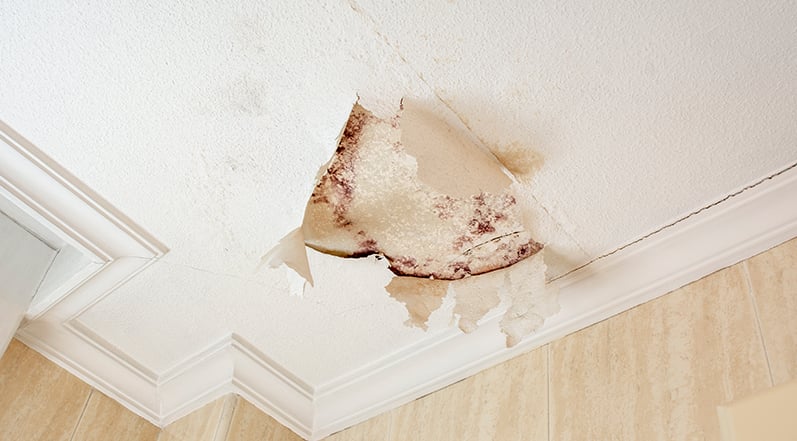
Here are some of the signs of a small roof leak:
- ● Ceiling spots: If uneven textures or spots on your ceiling are starting to appear, you’ll want to contact a roofing contractor immediately. You don’t want to ignore this issue, as it points to the possibility that water is actually making its way down to your ceiling from the roof. In the most extreme cases, sagging or bubbles in the ceiling can occur, or even erosion of the ceiling.
- ● Rusted nails: Rusty nails in your attic is evidence that there is moisture in your attic. You’ll want to contact a roofer to identify where moisture is entering your attic and to make any necessary repairs.
- ● Mold: Mold loves to grow in damp and dark places, and a moist attic is an ideal living space for these microorganisms. Mold and mildew aren’t just bad because of the accompanying musty smell– they can lead to health problems and eventually compromise the structure of your home.
- ● Pests: If you notice that there are critters of one kind or another in your attic, it’s something you’ll want to address right away. Depending on the type of pest, the potential negative effects can range from health hazards and diseases to house fires from critters chewing on critical electrical wiring. If there are pests in your attic, it means they’re getting in somehow, and you’ll want to determine their point of entry and resolve the problem right away. Whether or not they are getting in from the damage caused by a leak, critters being able to enter your attic likely means that water can, too.
What Can You Do to Prevent Roof Leaks?
As with many things in life, the best cure for small roof leaks is prevention. You can do several things to help prevent roof leaks from ever appearing, which will likely help you save money in the long run, not to mention reduce the chances that you’ll have to deal with the stress of dealing with a leaking roof.
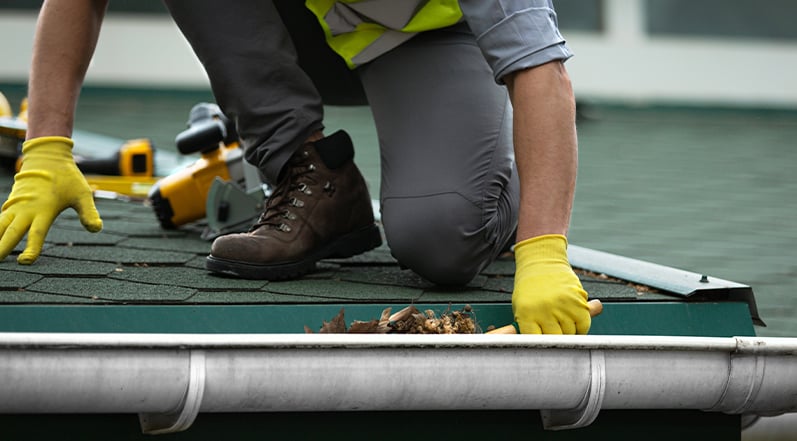
Some of the most important things you can do include:
- ● Regular inspections: One of the most important things you can do to prevent roof leaks is to conduct regular inspections of your roof, both from the exterior and the interior. It’s best to hire a pro for this, as they will have a keen eye for detecting problems or areas that are likely to become a problem in the future. Signs of damage and potential leak sources to look for when inspecting the roof include cracked flashing, damaged shingles, or deteriorating seals around chimneys and vents.
- ● Maintain gutters and downspouts: If you don’t keep your gutters and downspouts free from debris like twigs, leaves, and other obstructions, it can lead to water backing up and overflowing. It’s generally recommended to clean your gutters at least twice a year.
- ● Ensure you have proper attic insulation and ventilation: Adequate insulation helps to prevent ice dams and condensation, while proper ventilation helps ensure that your attic and roof systems don’t build up excessive temperatures or moisture.
- ● Trim trees near your roof: Falling branches or trees can end up causing significant damage to your roof during storms, so it’s important to remove any dead or weak trees near your home and trim back overhanging branches that could damage your roof.
- ● Address ice dams in the winter: Ice dams can lead to water backing up under your roof shingles. You can do several things to prevent ice dams, including ensuring you have proper ventilation and insulation as a part of your whole roof system.
- ● Address moss and algae growth on your roof: When moss or algae grows on your roof, it can retain moisture and accelerate your roofing material’s deterioration. It’s important to address any moss or algae growth promptly.
- ● Schedule regular professional roof maintenance: Regular roof maintenance performed by a professional roofer can help you identify any potential issues that are currently a problem or could be a problem in the future. Regular maintenance keeps your roof in good working order and can help you address any issues before they develop into major problems.
- ● Address all necessary roof repairs promptly: Any signs of damage on your roof or potential leaks should be addressed right away. As we’ve discussed at length, small issues can quickly escalate into large, expensive problems.
Being proactive is essential when it comes to preventing roof leaks. By taking these steps to avoid problems in the future, you can minimize the risk of leaks and water damage and extend the lifespan of your roof.
Did You Find a Small Leak in Your Roof?
When you can call a reputable team like our crew at Colony Roofers, a small roof leak isn’t something to worry about. Noticing a leak when it’s small is a good sign, as it means you can have repairs done before they are too extensive or expensive. You can trust Colony Roofers to quickly come out and look at your leaking roof, help you understand your options, and perform a high-quality and affordable roof repair.
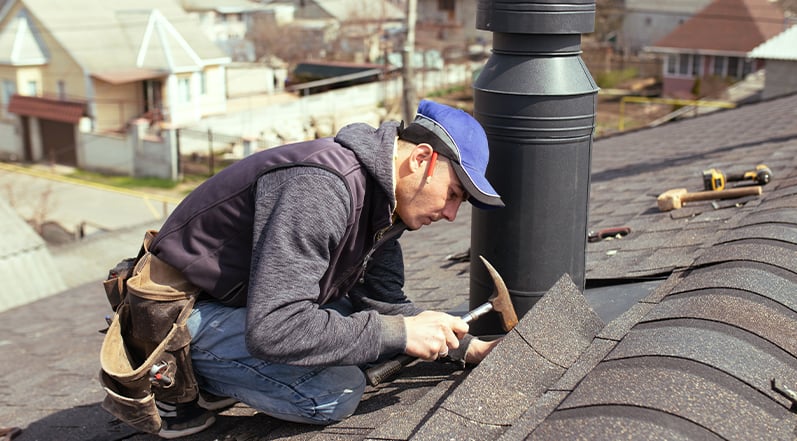
Is your home in the Atlanta area exhibiting one of the signs of a small leak? If so, don’t wait to give us a call. The sooner the problem is addressed, the simpler and less expensive the repair will be. If you’re ready to have us come out for a free estimate, contact us today.
 Call (678) 365-3138
Call (678) 365-3138

.jpg?width=352&height=352&name=roof%20leaks%20(1).jpg)
